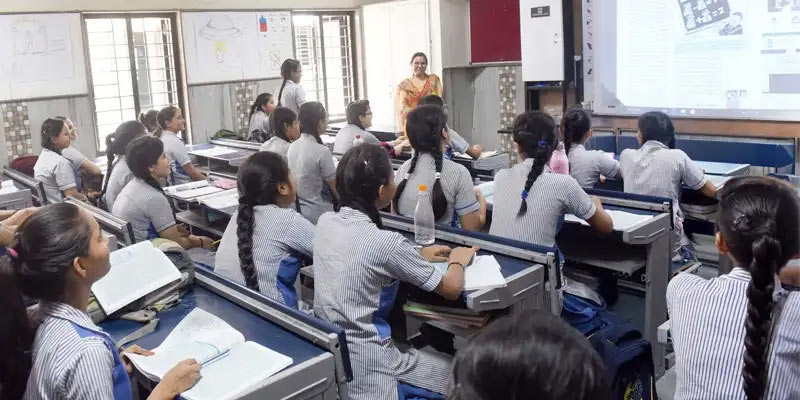Improving educational quality extends beyond teacher training; it encompasses the transformative journey of educators, write Mrinal Patwardhan and Bobby Abrol
Eklavya Model Residential School (EMRS) is a government initiative in India, dedicated to providing high-quality education to students from tribal backgrounds in remote regions. However, the cornerstone of improving educational quality extends beyond mere teacher training; it encompasses the transformative journey of educators as they embrace novel teaching methodologies. This transition isn’t instantaneous; rather, it necessitates challenging the entrenched norms of traditional teaching, often evolving into a lifelong experience for educators. At the heart of this educational evolution lies Experiential Learning Pedagogy (ELP), which aims to make children learn through joyful experiences from their surroundings. This pedagogy believes that learning is everywhere and occurs in various settings and situations in an interdisciplinary manner. Experiential learning is a joyful and multi-sensorial pedagogy that harnesses children’s creativity, communication, and critical thinking ability, making them ready for the 21st century skill set.
 |
‘Experiential Learning for the 21st Century,’ a multi-stakeholder Teacher Professional Development (TPD) project for Eklavya Model Residential School (EMRS) Teachers by the Central Board of Secondary Education (CBSE) & Ministry of Tribal Affairs (MoTA) in collaboration with Tata Trusts, Tata Institute of Social Sciences (TISS) and Mahatma Gandhi International School (MGIS), aims to enable EMRS teachers in understanding, applying, and adapting this pedagogy to their classrooms.
It is important to understand how EMRS teachers embraced ELP and explore the Panchsutri or the 5 R’s of teachers' learning journey accelerators.
- Recognition: A well-designed Teacher Professional Development programme (TPD) always aims to keep everyone engaged with the training; nevertheless, the teachers with higher engagement level need to be given early recognition. Generally, most TPD programmes have a good mix of teachers with higher engagement levels and teachers with average engagement levels in the training content. The highly engaged teachers need some handholding to make them dive deeper into their learning journey. In this course, the course team identified highly motivated and engaged teachers to help them use their potential and interests better.
- Responsibility: Entrusting the highly engaged teachers with additional responsibility within the training programme scope does wonders. The additional responsibility triggers a sense of achievement and boosts teachers’ self-esteem with a desire to elevate their interest and performance further. We involved the highly engaged teachers as mentors during our course run. The mentoring responsibility offered more learning opportunities to these teachers and established a professional learning community of teachers.
Review: The timely review of teachers' work, lesson plans and assignments by the course instructors and pedagogy experts is at the heart of the learning process for teachers. The ‘practice with feedback’ often makes teachers grasp the core elements of new pedagogy better. The course team did a thorough examination of the teachers’ work. This course design had built-in opportunities to think, practice, receive feedback, make changes, and discuss with their peers. This peer and expert review process offered numerous learning opportunities enabling teachers to master the training content and help address their misconceptions about the new pedagogy.
- Rapport: Large-scale TPD programme requires blending online and face-to-face training. Irrespective of the model format, what pushes teachers to scale new heights in training is how well the course team can build a rapport with them and the ease of access for teachers with the course team. Building rapport is the key to leveraging the potential of collaborative learning and team building. The course orchestration used technology platforms like WhatsApp and Telegram to make this rapport-building super easy and effective and to stay connected with the course instructors and peers.
- Reinforcement with a spiral curriculum: The power of retrieval practice can be exploited by making teachers revisit the training content periodically. Reinforcement by designing a spiral curriculum and delivering it through periodical, continuously developed interventions can transform TPD into Continued Professional Development (CPD). Teachers in the said course remained in touch with the course content for almost a year through different interventions like online training, face-to-face training, mentoring, and project assignments. These repeated interventions offered teachers self-learning and self-practice opportunities to advance their learning journey.
Presently, all the states in the country are striving to update their TPD mechanisms to adopt an experiential learning approach in the light of National Education Policy (NEP) 2020. The focus of these TPD endeavours is to offer pedagogy-based courses and meet the 50 hours of CPD requirement to create a quality teaching force for every child in the remotest village of the country to learn better.
(The authors are lead research consultant, and lead, Developing Teachers, Tata Trusts, respectively)
This article was published in The Education Times on April 30, 2024
